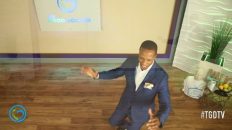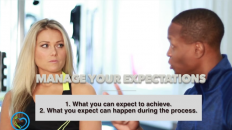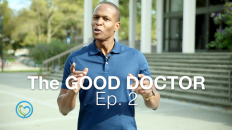Dr. Dave and Nurse Shams teach us How To Save A Life. CPR isn’t like you remember it. Check out the latest!
Do you know what to do if someone passes out? Share your knowledge in the Comments below.
Dr. Dave: Have you ever been in a situation where there’s somebody who passed out and you didn’t know what to do, you felt helpless?
Nurse Shams: Absolutely, except I’ve been trained, so thankfully I knew exactly what to do.
Dr. Dave: You are a cardiac nurse after all.
Nurse Shams: After all.
Dr. Dave: Yes.
Nurse Shams: What about you guys at home?
Dr. Dave: Yes.
Nurse Shams: Do you know what to do if you see someone passes out?
Dr. Dave: Yes. Do you know if somebody passes out, how to save a life?
Nurse Shams: This is a serious thing. Every 90 seconds somebody experiences cardiac arrest.
Dr. Dave: Which means about 300,000 people a year are gonna suffer from cardiac arrest.
Nurse Shams: That’s right.
Dr. Dave: The most important thing for you to do, is to recognize that it’s happened. And as the name implies, it strikes suddenly.
Nurse Shams: Just like that, they are out cold and I want you guys to really pay attention to this. This person is not talking to you, they’re completely unresponsive.
Dr. Dave: Yes. It’s important that you understand that. If they are making any communication, any talking, any sounds, the likelihood is that they haven’t had a cardiac arrest.
Nurse Shams: Exactly.
Dr. Dave: So when you shake them, “Sir, sir, sir, can you hear me? Sir, sir, sir, can you hear me?” And you hear-
Nurse Shams: Nothing.
Dr. Dave: … nothing, then you know.
Nurse Shams: We gotta call for help, so-
Dr. Dave: You gotta call for help, yes.
Nurse Shams: … if you happen to be around a bunch of people, go ahead and designate someone, “Hey. You call 911.” If you’re by yourself, just get your phone immediately and call it in.
Dr. Dave: It’s really important that you do this part. In a situation like this, there’s a lot of high energy, a lot of anxiety, but you’ve gotta communicate clearly that you need somebody to do that.
Nurse Shams: That’s right.
Dr. Dave: Yes.
Nurse Shams: Every minute counts.
Dr. Dave: Every minute counts. As it turns out, four to six minutes of lack of blood flow to this brain, and you have permanent brain damage.
Nurse Shams: Yes. So how do we check for that pulse? Alright. So you’re gonna take your two fingers, and we’re gonna check here in the angle of the neck, for what we call the carotid artery, and you want to press kind of firmly, and check for about 10 seconds to feel that pulse.
Dr. Dave: Yes. You want about 10 seconds, because sometimes the heart is beating slow, not necessarily not beating at all.
Nurse Shams: Right.
Dr. Dave: But if you don’t feel a pulse, then you know. No more mouth-to-mouth. It’s really important for us to understand that. What we need to do is focus on chest compressions.
Heel of your hand goes in the center of the chest, you support it with your other hand, and with your arms locked you’re gonna go deep and fast, deep and fast.
Nurse Shams: And even though Dave makes this look really easy, this is actually very exhausting, especially if you’re not used to doing this. So if you happen to be with somebody else, it’s okay to go ahead and say, “I need a break, you jump in.”
Dr. Dave: Yes. Just five minutes of this will make you very, very tired. It’s really important that you communicate with people that you want help.
We want minimal interruptions when it comes to this, because time is brain. The less time you have without blood flow to your brain, the better it is. And that turns bystanders into life savers.
The research shows, if you can learn these very simple straightforward steps, we can save a life.
(singing)
This is the fun that we’re gonna have on The Good Doctor. When you’re done watching our show, we want you to have learned, to have laughed, and to have been uplifted.
The Good Doctor. We’ll see you next time.
(singing)
Yeah.



